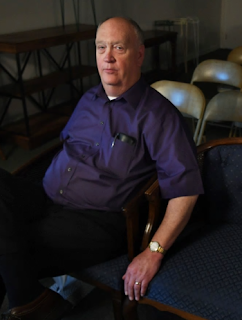Rural coroner made the tough calls on his town’s opioid epidemic

Coroner Steve Talbott, in his funeral home
(Photo by Michael S. Williamson, The Washington Post)
—–
How many rural coroners, witnessing death after death from opioid overdoses, would call police in an effort to see how their county was being inundated by the misused prescription drugs? We don’t know the answer to that question, but we do know what funeral director Steve Talbott, the elected coroner of Clinton County for the last 25 years, did. He made the calls, and one result was the conviction of a local physician who shared a building with the pharmacy that dispensed more opioids per person per county in 2006-12 than any in the U.S.
Jenn Abelson, Andrew Ba Tran, Beth Reinhard and Aaron C. Davis of The Washington Post reported the story last week, following the Post’s publication of other stories drawing on the Drug Enforcement Administration database for those years. Their story is a look at the opioid epidemic from the bottom up, in Albany, Paintsville and Booneville; Kanab, Utah; and Carthage, Tenn., where pharmacies were funnels for large volumes of painkillers.
When Talbott responded as coroner to an overdose death, the Post reports, “Friends and relatives of the dead rarely had answers to Talbott’s questions: What kind of pills did they take and where did they come from? A toxicology report often answered the first question. It was the second one that typically eluded Talbott. As overdose deaths soared, Talbott repeatedly called the state police, hoping they could identify the source of opioids poisoning his community.”
 |
| Clinton County (Wikipedia map) |
Since 2006, 41 people have died of prescription opioid overdoses in the county of 10,000. Talbott told the Post that law enforcement took far too long to pay attention. “The federal investigation began in 2015 after Talbott noticed multiple overdose deaths involving patients of a local physician, Michael L. Cummings, and the Kentucky Board of Medical Licensure expert found Cummings’s treatment of several patients fell below minimum standards of care, court records show,” the Post reports. “In 2017, Cummings was charged in federal court with the illegal distribution of controlled substances, which resulted in the deaths of three patients.” He pleaded guilty in March to 13 counts of illegally prescribing controlled substances, and was sentenced July 24 to 30 months in prison and fined $400,000. Cummings had his medical practice in the same building as Shearer Drug, operated by Kent Shearer, who declined to comment.